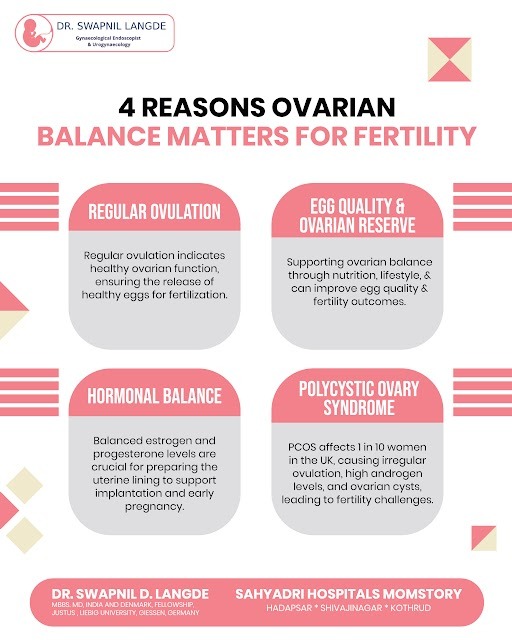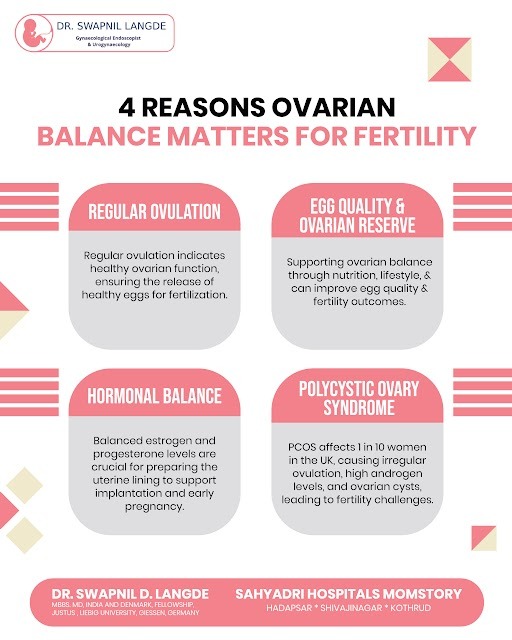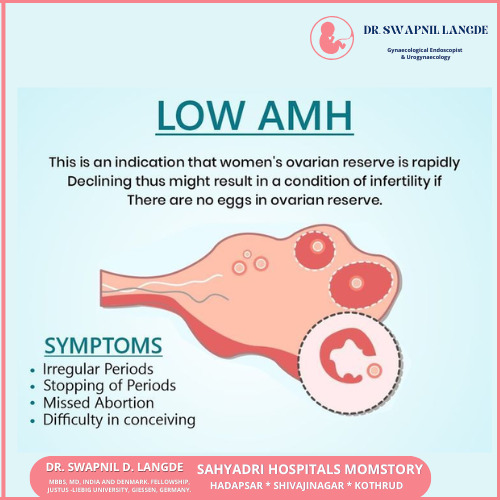#DrSwapnilLangde
Explore tagged Tumblr posts
Text

Unlock your body’s natural healing potential with advanced Stem Cell Therapy under the expert care of Dr. Swapnil Langde. This innovative treatment follows six essential stages—patient evaluation, stem cell harvesting, lab processing, targeted injection, post-procedure care, and ongoing monitoring—to ensure safe, personalized, and effective results. Whether you're dealing with orthopedic issues, joint pain, or degenerative conditions, Dr. Langde offers scientifically-backed regenerative solutions tailored to your needs.
#StemCellTherapy#RegenerativeMedicine#DrSwapnilLangde#JointPainRelief#OrthopedicCare#HealingNaturally#CellTherapy#PuneDoctors#Ask ChatGPT
0 notes
Text

Low AMH (Anti-Müllerian Hormone) levels can impact a woman’s fertility potential. Common causes include age-related decline, genetic factors, autoimmune conditions, PCOS, prior ovarian surgery, or cancer treatments like chemotherapy. Early diagnosis and expert guidance are crucial.
👨⚕️ Consult Dr. Swapnil Langde for personalized fertility assessment and advanced reproductive care.
#LowAMH#FertilityAwareness#WomensHealth#DrSwapnilLangde#EggReserve#FertilityCare#PCOS#ReproductiveHealth
0 notes
Text

Early detection of miscarriage signs is crucial for timely medical care. If you're experiencing heavy bleeding, severe cramps, lower back pain, or the passing of clots or tissue, consult your gynecologist immediately. Dr. Swapnil Langde provides expert care and compassionate support for women's reproductive health.
0 notes
Text
Potential Signs of Miscarriage: What You Need to Know

Pregnancy is a time filled with excitement and anticipation. However, it’s also natural to feel anxious about the possibility of complications. One such concern for expecting mothers is the risk of miscarriage, especially during the early stages of pregnancy. While not all symptoms indicate a miscarriage, being aware of the potential signs can help you seek timely medical care.
What is a miscarriage?
A miscarriage, also known as spontaneous pregnancy loss, typically occurs before the 20th week of pregnancy. It is more common than many people realize, and in most cases, it is not caused by anything the mother did or did not do. However, recognizing early signs can help in seeking prompt medical attention.
Potential Signs of Miscarriage
1. Vaginal Bleeding or Spotting
While light spotting can be normal in early pregnancy, heavier bleeding similar to a period, or passing clots or tissue, may indicate a miscarriage.
2. Severe Abdominal or Back Pain
Cramping is common during early pregnancy, but intense, persistent pain in the lower abdomen or lower back could be a warning sign.
3. Passing Tissue or Clots from the Vagina
Passing grayish or pinkish tissue or large clots can indicate that a miscarriage may be happening.
4. Sudden Loss of Pregnancy Symptoms
If symptoms such as breast tenderness, morning sickness, or fatigue suddenly disappear, it might be a cause for concern, especially if accompanied by other symptoms.
5. Fluid Leakage from the Vagina
If you experience a sudden gush of clear fluid, it could indicate that your water has broken prematurely, which is a serious concern during early pregnancy.
6. Feeling Faint or Weak
Extreme dizziness, light-headedness, or weakness along with other symptoms should be evaluated immediately.
What to Do If You Notice These Signs?
If you experience any of these symptoms, do not panic. Many pregnancies continue normally even after minor bleeding or cramping. However, it’s essential to consult your doctor immediately for evaluation. An ultrasound or blood tests may be needed to assess your condition.
When to See a Doctor?
If you suspect any abnormal signs during pregnancy, especially bleeding or severe pain, book an appointment with your gynecologist without delay. Early intervention can make a significant difference.
Final Thoughts
Miscarriage is emotionally and physically challenging, but remember, most women who experience a miscarriage go on to have successful pregnancies in the future. Staying informed, attending regular check-ups, and seeking medical advice promptly can help ensure the best possible care for you and your baby.
0 notes
Text

Early detection of miscarriage signs is crucial for timely medical care. If you're experiencing heavy bleeding, severe cramps, lower back pain, or the passing of clots or tissue, consult your gynecologist immediately. Dr. Swapnil Langde provides expert care and compassionate support for women's reproductive health.
#MiscarriageAwareness#PregnancyCare#Gynecologist#WomensHealth#DrSwapnilLangde#PuneGynecologist#PregnancySupport#EarlyPregnancyCare#ReproductiveHealth#ObstetricCare
0 notes
Text

Recurrent miscarriages, also known as recurrent pregnancy loss (RPL), refer to the loss of two or more pregnancies consecutively. This condition can be emotionally and physically challenging for couples aspiring to start or grow their families. Dr. Swapnil D. Langde, a renowned expert in reproductive health, offers comprehensive care and tailored solutions to address this concern. Causes of Recurrent Miscarriages Recurrent miscarriages may result from various factors, including: 1.Genetic Abnormalities: Chromosomal abnormalities in the embryo. 2.Hormonal Imbalances: Conditions like polycystic ovary syndrome (PCOS) or thyroid disorders. 3.Uterine Abnormalities: Structural issues such as uterine septum or fibroids. 4.Autoimmune Disorders: Conditions like antiphospholipid syndrome. 5.Infections: Chronic infections that affect reproductive health. 6.Lifestyle Factors: Smoking, alcohol consumption, or excessive stress. Struggling with recurrent pregnancy loss in Hadapsar? Consult Dr. Swapnil D. Langde, a trusted gynecologist specializing in recurrent miscarriages. Receive compassionate care and expert solutions for a healthier pregnancy journey.
0 notes
Text

Your ovarian health could be the key! Balanced ovaries help regulate ovulation, maintain hormone levels, and improve egg quality — all essential for fertility. Consult Dr. Swapnil Langde for expert guidance and personalized fertility care.⚖️ Balanced ovaries play a key role in fertility! They help regulate ovulation, improve egg quality, and maintain hormonal harmony. Consult Dr. Swapnil Langde for expert fertility care.
0 notes
Text

Recurrent miscarriage can be emotionally distressing and often leaves couples searching for answers. Several factors can contribute to repeated pregnancy loss, including genetic abnormalities, hormonal imbalances, uterine abnormalities, thyroid disorders, blood clotting issues, infections, lifestyle factors, and immune system problems.
Early diagnosis and expert care are key to improving your chances of a healthy pregnancy. Dr. Swapnil Langde provides thorough evaluation and personalized fertility care to help couples overcome these challenges.
0 notes
Text

Healthy ovarian function is key to fertility. Here are 4 reasons why ovarian balance matters: it regulates ovulation, supports hormone levels, improves egg quality, and enhances conception chances. Struggling with fertility? Consult Dr. Swapnil Langde for expert evaluation and treatment.
0 notes
Text
Understanding the Causes of Male Infertility

Infertility is often thought of as a women’s health issue, but in reality, male infertility contributes to nearly 40-50% of all infertility cases. Understanding the underlying causes is the first step toward finding effective treatment and building the family you desire.
As a specialist in reproductive health, Dr. Swapnil Langde highlights the key causes of male infertility that every couple should be aware of.
⚠️ Common Causes of Male Infertility
1. Low Sperm Count (Oligospermia)
A low sperm count means fewer than 15 million sperm per milliliter of semen. This reduces the chances of fertilizing an egg naturally.
2. Poor Sperm Motility
Sperm motility refers to the ability of sperm to swim efficiently. If sperm cannot move properly, they cannot reach and fertilize the egg.
3. Abnormal Sperm Shape (Teratospermia)
Sperm with abnormal shape or structure often struggle to penetrate the egg, affecting fertility.
4. Hormonal Imbalances
Imbalances in hormones such as testosterone, FSH, and LH can negatively impact sperm production and overall reproductive health.
5. Varicocele (Swollen Veins in the Scrotum)
This is one of the most common, treatable causes of male infertility. Varicocele affects sperm quality and production by increasing the temperature in the testicles.
6. Infections
Sexually transmitted infections (STIs) like chlamydia or gonorrhea, as well as other infections, can damage sperm health or cause blockages.
7. Lifestyle Factors
Unhealthy habits such as smoking, excessive alcohol consumption, drug use, obesity, and poor diet can all contribute to reduced fertility.
8. Exposure to Environmental Toxins
Prolonged exposure to harmful chemicals, radiation, heavy metals, or excessive heat (like hot baths or saunas) can lower sperm count and quality.
9. Genetic Factors
In some cases, genetic conditions such as Klinefelter syndrome or Y chromosome microdeletions can impair sperm production.
10. Ejaculation Disorders
Issues such as retrograde ejaculation (semen entering the bladder instead of exiting the penis) can interfere with conception.
🩺 When to Seek Help?
If you and your partner have been trying to conceive for 12 months or more without success, it’s essential to consult a specialist. Dr. Swapnil Langde offers advanced diagnostic tests and personalized treatment plans to help overcome male infertility challenges.
🌟 Expert Care for Male Fertility
Early diagnosis and the right approach can significantly improve the chances of conception. Don’t hesitate to seek professional guidance.
Schedule a consultation with Dr. Swapnil Langde today and take a step toward parenthood.
0 notes
Text

Male infertility can be caused by several underlying factors such as low sperm count, poor sperm motility, hormonal imbalances, lifestyle habits, or past infections. Conditions like varicocele, genetic disorders, or exposure to environmental toxins may also affect fertility. At our clinic, Dr. Swapnil Langde offers advanced diagnostic tests and personalized treatment plans to help men overcome fertility challenges. If you're facing difficulty in conceiving, consult Dr. Langde for expert guidance and support.
0 notes
Text

Discover the potential of Stem Cell Therapy with Dr. Swapnil Langde — a trusted expert in advanced regenerative treatments. Stem cell therapy can help repair damaged tissues, reduce inflammation, and restore function in conditions like osteoarthritis, joint injuries, and orthopedic disorders. At our clinic, we offer safe, science-backed solutions tailored to your needs. Take a step toward pain-free living with innovative care from Dr. Swapnil Langde.
#StemCellTherapy#DrSwapnilLangde#RegenerativeMedicine#JointPainRelief#ArthritisTreatment#OrthopedicCare#NonSurgicalTreatment#TissueRegeneration#PainManagement#AdvancedTherapy
0 notes
Text

Low AMH levels can affect your fertility, but it doesn't mean the end of your motherhood journey. At our fertility clinic, Dr. Swapnil Langde offers expert diagnosis and personalized treatment options to help you conceive. Understand the causes of low AMH and take control of your reproductive health today. 📌 Book your consultation with Dr. Swapnil Langde – your trusted fertility specialist.
#LowAMH#FertilitySpecialist#DrSwapnilLangde#WomensHealth#EggReserve#AMHLevels#IVFTreatment#InfertilityCare#FertilityClinicPune#HopeForMotherhood
0 notes
Text

Repeated pregnancy loss can be heartbreaking, but you're not alone. Dr. Swapnil Langde provides expert diagnosis and personalized care to uncover the underlying causes—whether hormonal, genetic, anatomical, or immune-related. Take the first step towards a healthy pregnancy with compassionate support and evidence-based treatment.
#infertility treatment in kothrud#ovarian rejuvenation and treatment in kothrud#drswapnillangde#low amh treatment in kotrud
0 notes
Text

Low Anti-Müllerian Hormone (AMH) levels indicate reduced ovarian reserve, which can affect fertility. Common symptoms include irregular periods, difficulty conceiving, and hormonal imbalances. Early diagnosis and guidance from Dr. Swapnil Langde can help you explore the best treatment options to improve reproductive health.
#LowAMH#FertilityCare#DrSwapnilLangde#OvarianReserve#WomenHealth#FertilitySupport#ReproductiveHealth#PuneDoctors#FertilitySpecialist#HealthyEggs#HormonalBalance#infertility treatment in kothrud
0 notes
Text
Understanding Low AMH: Symptoms and Fertility Insights

When it comes to a woman’s fertility health, one important hormone that plays a vital role is Anti-Müllerian Hormone (AMH). Low AMH levels can be concerning, especially for women trying to conceive. But what exactly does it mean, and what are the symptoms to look out for?
What is AMH?
AMH is a hormone secreted by ovarian follicles and is often used as a marker to estimate a woman’s ovarian reserve—that is, the quantity of eggs remaining in her ovaries. Low AMH levels suggest a reduced ovarian reserve, which may impact fertility.
Common Symptoms of Low AMH
Low AMH levels typically do not cause obvious symptoms. However, women may notice certain signs that indicate a decline in reproductive health:
1. Irregular Menstrual Cycles
Women with low AMH might experience shorter or irregular periods, as a reduced egg supply can disrupt the normal menstrual cycle.
2. Difficulty Conceiving
One of the most common signs is infertility or trouble getting pregnant, especially after several months of trying naturally.
3. Early Menopause Symptoms
Low AMH can be associated with signs of early menopause, such as hot flashes, night sweats, mood swings, and vaginal dryness.
4. Family History of Early Menopause
If there's a family history of early menopause, it might be linked with lower AMH levels at an earlier age.
What Causes Low AMH?
Several factors can contribute to a decline in AMH levels, including:
Age (AMH naturally declines with age)
Genetics
Autoimmune conditions
Surgical removal of part of the ovary
Lifestyle factors like smoking or stress
Can You Still Conceive with Low AMH?
Yes, pregnancy is still possible with low AMH. With the right evaluation and timely fertility treatment, many women can achieve successful outcomes.
👨⚕️ Dr. Swapnil Langde, a renowned fertility specialist, offers expert guidance and personalized fertility plans for women facing low AMH levels. From lifestyle counseling to advanced reproductive technologies, Dr. Langde supports you every step of the way on your fertility journey.
When to See a Fertility Specialist?
If you're under 35 and have been trying to conceive for over a year—or over 35 and trying for more than six months—it’s time to consult a specialist. Early evaluation is the key to improving your chances.
📍 Consult with Dr. Swapnil Langde today and take proactive steps toward your parenthood goals.
#LowAMH#FertilityCare#WomensHealth#InfertilityTreatment#DrSwapnilLangde#FertilitySpecialist#AMHLevels#TryingToConceive#FertilityAwareness#OvarianReserve
0 notes